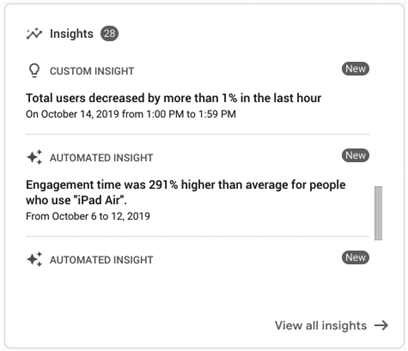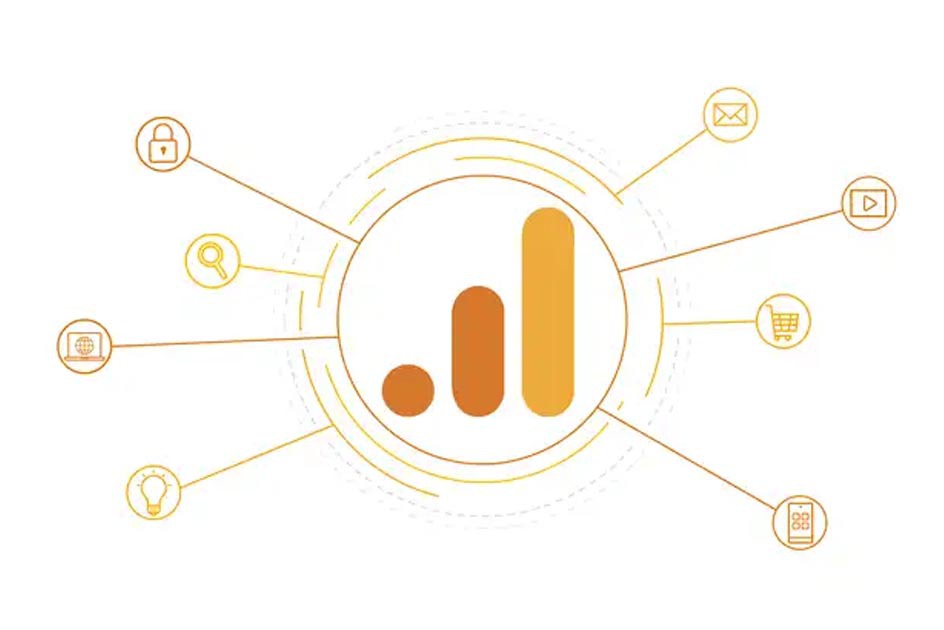We have been asked by a few clients how Google Analytics 4 (GA4) will impact their business. GA4 represents a big change in how Google collects and models data, but this does not necessarily mean a substantial change in what we are collecting and reporting on for clients. Let’s take a closer look at what GA4 will mean for you.
What Is GA4?
Google Analytics 4 is different from its predecessor, Universal Analytics (UA), in a few key ways: user-privacy, app + web measurement, and advanced machine-learning models. These changes are due to industry and legislative shifts in how privacy is protected, how customers use the internet, and the maturation of AI tools that Google has been developing.
Why was GA4 created?
Privacy
By the end of 2023, third-party cookies will be deprecated by all major browsers. Third-party cookies are part of what allowed UA to collect the data it needed to function correctly. The world is moving to alternatives that better respect privacy for end-users while still allowing advertisers to reach their target audience. Our Strategist, Ryan Sanecki, wrote more about the end of third-party cookies and their impact, which is available upon request.
Furthermore, General Data Protection Regulation (GDPR) in Europe and The California Consumer Privacy Act (CCPA) has facilitated the need for a privacy-focused analytics platform that complies with this and future legislation.
App + Web Measurement
Customers today interact with your brand across multiple channels and devices on their journey. They may use Gmail on their phone to look at an email you sent them and then opt to visit your website on their laptop to buy a product.
Whereas UA was built for websites, GA4 is built for cross-channel measurement so that conversions across multiple apps, devices, and your website become unified in their reporting. This will help provide insights like the path someone who watches a YouTube video takes to buy a product on your website and if they convert more than someone who first finds your business through a paid search ad. The result is better allocating budget to high-performing channels, improving long-term ROI.
The information to make these decisions is currently available, but the data is discontiguous and requires time-consuming analysis. GA4 will help automate this reporting and provide automated insights.
Machine Learning
Because of more stringent requirements for respecting privacy, we will have a lot of recorded events without user identifiers. Imagine someone clicks on a paid ad on their tablet then later buys a product on their phone. Previously, that conversion - which should be attributed to the ad - would be lost. There is where Conversion Modeling comes in and is best described by Google itself:
“Conversion modeling refers to the use of machine learning to quantify the impact of marketing efforts when a subset of conversions can’t be observed. For example, when measuring conversions across devices, there may not be cookies available to link these devices. In this case, you’ll be unable to attribute some of your conversions to the corresponding customers who interacted with an ad. If no modeling techniques are employed, this attribution problem will leave holes in the customer journey, prohibiting you from fully understanding your customers’ paths to conversion. But with a modeling foundation in place, observable data can feed algorithms that also make use of historical trends to confidently validate and inform measurement.
Modeling enables accurate measurement while only reporting on aggregated and anonymized data. This unlocks a full, privacy-centric picture of your customer behavior, ensuring that your performance doesn’t suffer just because direct measurement isn’t always possible.”
Another use of machine learning is the introduction of automated insights. GA4 can identify and assign value to outliers in data that can help inform decision-making. For example, automated insights may tell us that a specific device may convert more than others, so we can make bid adjustments in Google Ads to capitalize on that knowledge.

What is TKG doing with GA4?
Universal Analytics is still alive but will eventually be phased out and replaced with GA4. At this time, TKG and many others are following a standard practice of running both UA and GA4 concurrently. We can port events configured in UA over to GA4, which is very simple.
It’s essential to keep in mind that GA4’s creation is driven heavily in response to changes in privacy legislation. UA was built to leverage third-party cookie data, while GA4 enables a cookie-less world, and we are currently transitioning between those two eras.
We are still after the same data, but these analytic platforms acquire data differently. There are benefits unique to UA and GA4, respectively, and that is why running both is currently the preferred solution.
Should you have any further questions about the transition to GA4, please reach out to TKG, and we will be glad to help.



